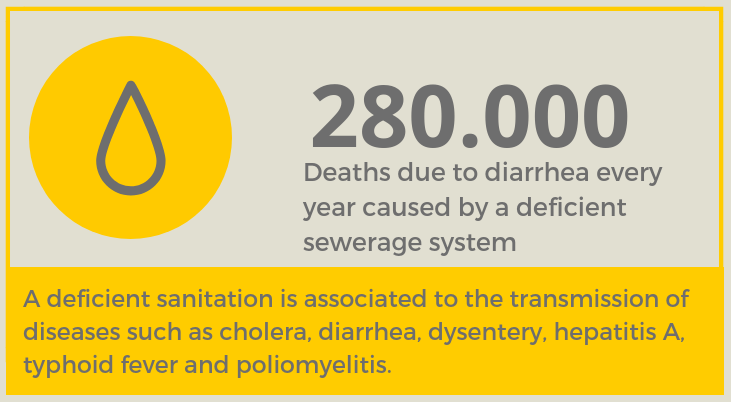When nature calls (World Toilet Day 2018)
- 19 November, 2018

.November 19th is the World Toilet Day. To some can be unimportant, but the toilet is a hygienic and sustainable progress of every developed society. As we mentioned in another article, decent and functional sanitation prevents diseases and contributes to the development of countries. And a good sanitation has to guarantee individual toilets in decent conditions in every home.
The sophisticated toilet we find today in our restrooms has its origin in 1597. It was invented by the British writer Sir John Harington. He showed his invention to Queen Elizabeth I from England, who was so impressed for its efficacy that she ordered to get one for herself. However, it was Alexander Cummings who patented the toilet in 1775, almost 200 years after the original invention. In 1848 it was stipulated in a public health law that every new house had to count with a toilet.
Sanitation, Sustainable Development Goal 6
It's been two centuries since the lavatory is considered a public health issue for its importance in hygiene. In addition, the toilet use prevents contamination of the environment. And this is the topic of World Toilet Day 2018. The Sustainable Development Goal 6 (SDG 6) of United Nations is to ensure availability and sustainable management of sanitation and water for all by 2030. According to UN-Water we are far to get this goal accomplished. This could risk the entire 2030 Agenda for Sustainable Development.

Data from WHO
The organization claims that the exposure to these insalubrious conditions has a devastating impact. It affects public health, living and working conditions, nutrition, education and economic productivity across the world. And yet, billions of people don't have a toilet. This means human faeces, on a massive scale, is not being captured or treated, contaminating water and soil, foundation of human life. In addition, women and female children that live in areas where outdoor defecation is usual, sometimes have to wait until dark to go to the exterior. The lack of access to safe facilities near their homes can end in attack, rape or even murder.
A future with sustainable sanitation
Despite of this pessimist data, positive measures are being taken worldwide. The goal of the project Clean India Mission is to build 90 million toilets in houses and populated areas from rural India. This project has inspired many organizations to prepare sustainable and affordable sanitation models. In Warji (Nigeria) the local government is educating in the consequences of defecation in the open, getting the population aware of the relation between this custom and epidemic outbreaks.
In our community, where the use of toilet is already part of our daily routine, we must collaborate with SDG 6 reducing the contamination of our sanitation facilities. As we already explained in other articles, if the gravity system has a fissure, it's very difficult to detect and solve, which can filtrate waste water to the soil. In a vacuum system, fissures are rapidly detected. And, as air enters the systems, the valves stop, avoiding any contamination. In our developed societies we must see the vacuum sewerage as the most ecological sanitation system.
Get our news
Temas
Archives
FLOVAC
Flovac is the world's leading vacuum sewerage engineering, supplier and operation company.
Primer de Maig 4 Street
08980, Barcelona
Spain

CONTACT US
COPYRIGHT © 2021 FLOVAC - THE GREEN FUTURE OF SEWERAGE


